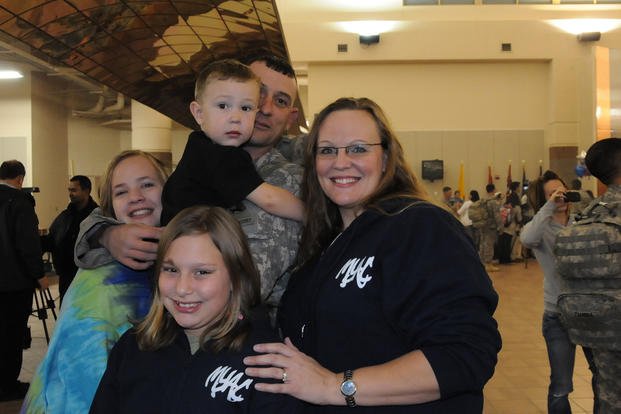WASHINGTON -- U.S. soldiers who returned from Iraq before Christmas often received emotional welcomes from family and friends at airports and military bases across the country, but after fighting in the war, many face a new battle at home: finding a job.
In a typical scene, which became a staple of U.S. newscasts in the weeks before Christmas, excited relatives hold up signs with messages like "We missed you," as soldiers in desert fatigues are hugged by children shouting, "Daddy, Daddy," and a wife with tears streaming down her face.
American soldiers are hailed as heroes in the eyes of their countrymen, but those whose military enlistments are soon expiring could be pounding the pavement in search of work with difficult prospects.
The U.S. economy remains anemic, and unemployment has actually fallen a bit in recent months to 8.6%, still far above the average of recent decades. About one in three veterans ages 20-24 is without a job, USA Today reported.
A major hurdle is that many employers don't understand the value of the skills and experience of former soldiers, Tom Tarantino -- himself a veteran and spokesman for Iraq and Afghanistan Veterans of America (IAVA) -- said in a congressional hearing earlier in 2011.
Former soldiers who find work are often paid less than a comparable non-veteran. Tarantino said an IAVA member told him his job applications read like a war novel, because he has "had to take what he can get."
Brandon Schoonover earned a finance degree after serving as a Marine infantryman but has been unable to find a full-time job in the two years since he graduated. His main work experience is four years as the leader of a 12-man squadron into Iraqi combat zones, he told USA Today.
"It's just discouraging," he told the newspaper while attending a job fair for veterans in Philadelphia. "I did a lot of hard work in the military and then went on to get my degree, but there's no willingness to give me a chance."
Many employers worry that veterans could be called back to service after they are hired. Others are concerned that veterans could be susceptible to post-traumatic stress disorder (PTSD) or depression. The IAVA cites studies showing that between 20%-35% of soldiers who served in combat in Iraq and Afghanistan could bear these emotional scars.
These problems are manifested in higher rates of alcoholism and suicide. Tarantino said 59% of IAVA members surveyed knew a fellow soldier who had taken his own life. The rate of homelessness among veterans is also higher than the population at large.
The Veterans Administration (now the Department of Veterans Affairs), the cabinet-level federal agency charged with providing assistance and medical care for former soldiers, estimates that 30% of homeless adults in the U.S. are veterans.
Returning veterans who stay in the military also have difficulties. Although soldiers' income is higher than ever, their household budgets often are tight, The Washington Post reported. This is largely due to the high unemployment rate -- 26% -- among the soldiers' spouses and partners, who often have to quit working due to frequent relocations or to look after children while the serviceperson is deployed.
The U.S. government has expanded efforts to help veterans transition to civilian life. Showing rare unity, Republicans and Democrats recently passed a law creating tax incentives for companies to employ former soldiers.
With the Iraq pullout completed, the U.S. is slated to remove troops from Afghanistan in the next few years. The White House estimates that 1 million current soldiers will enter the civilian workforce in the next five years.
Want to Know More About the Military?
Be sure to get the latest news about the U.S. military, as well as critical info about how to join and all the benefits of service. Subscribe to Military.com and receive customized updates delivered straight to your inbox.











